|
|
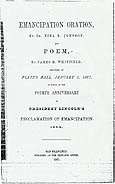
|
|
EMANCIPATION ORATION,
By Dr. Ezra R. Johnson,
and
POEM,
By James M. Whitfield,
delivered at
PLATT'S HALL, JANUARY 1, 1867,
in honor of the
FOURTH ANNIVERSARY
of
PRESIDENT LINCOLN'S
PROCLAMATION OF EMANCIPATION.
1864.
----------
San Francisco:
Published at the Elevator Office.
1867.
|
|
|
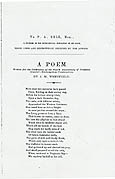
|
|
To P. A. BELL, Esq.,
A PIONEER IN THE INTELLECTUAL ELEVATION OF HIS RACE,
THESE LINES ARE RESPECTFULLY INSCRIBED BY THE AUTHOR.
-------------------------
A POEM
Written for the Celebration of the Fourth Anniversary of President
Lincoln's Emancipation Proclamation.
BY J. M. WHITFIELD.
--------
More than two centuries have passed
Since, holding on their stormy way,
Before the furious wintry blast,
Upon a dark December day,
Two sails, with different intent,
Approached the Western Continent.
One vessel bore as rich a freight
As ever yet has crossed the wave;
The living germs to form a State
That knows no master, owns no slave.
She bore the pilgrims to that strand
Which since is rendered classic soil,
Where all the honors of the land
May reach the hardy sons of toil.
The other bore the baleful seeds
Of future fratricidal strife,
The germ of dark and bloody deeds,
Which prey upon a nation's life.
The trafficker in human souls
Had gathered up and chained his prey,
And stood prepared to call the rolls,
When, anchored in Virginia's Bay--
His captives landed on her soil,
|
|
|
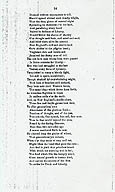
|
|
Doomed without recompense to toil,
Should spread abroad such deadly blight,
That the deep gloom of mental night
Spreading its darkness o'er the land,
And paralizing every hand
Raised in defense of Liberty,
Should throw the chains of slavery
O'er thought and limb, and mind and soul,
And bend them all to its control.
New England's cold and sterile land
Gave shelter to the pilgrim band;
Virginia's rich and fertile soil
Received the dusky sons of toil.
The one bore men whose lives were passed
In fierce contests for liberty---
Men who had struggled to the last
'Gainst every form of tyranny.
Vanquished in many a bloody fight,
Yet still in spirit unsubdued;
Though crushed by overwhelming might,
With love of freedom still imbued,
They bore unto their Western home,
The same ideas which drove them forth,
As houseless fugitives to roam
In endless exile o'er the earth.
And, on New England's sterile shore,
Those few and feeble germs took root,
To after generations bore
Abundance of the glorious fruit---
Freedom of thought, and of the pen,
Free schools, free speech, free soil, free men.
Thus in that world beyond the seas,
Found by the daring Genoese,
More than two centuries ago
A sower wandered forth to sow.
He planted deep the grains of wheat,
That generations yet unborn,
When e'er they came to reap and eat,
Might bless the hand that gave the corn;
And find it yield that priceless bread
With which the starving soul is fed;
The food which fills the hungry mind,
Gives mental growth to human kind,
And nerves the sinews of the free
To strike for Truth and Liberty.
|
|
|
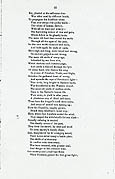
|
|
Yet, planted at the self-same time
Was other seed by different hands,
To propagate the deadliest crime
That ever swept o'er guilty lands---
The crime of human slavery,
With all its want and misery---
The harrowing scenes of woe and pain,
Which follow in its ghastly train.
The same old feud that cursed the earth
Through all the ages of the past,
In this new world obtained new birth,
And built again its walls of caste,
More high and deep, more broad and strong,
On ancient prejudice and wrong.
The same old strife of every age,
Inherited by son from sire,
Which darkens each historic page,
And sends a discord through the lyre
Of every bard, who frames his song
In praise of Freedom, Truth, and Right,
Rebukes the gathered hosts of wrong,
And spreads the rays of Freedom's light ---
That strife, long fought in Eastern lands,
Was transferred to the Western strand.
The same old seeds of endless strife,
Deep in the Nation's inmost life
Were sown, to yield in after years
A plenteous crop of blood and tears.
'Twas here the dragon's teeth were sown,
And crops of armed men sprang up;
Here the Republic, mighty grown,
Drank deep rebellion's bitter cup;
Here, where her founders sowed the wind,
They reaped the whirlwind's furious blast ---
Proudly refusing to rescind
The deadly errors of the past,
They drew the sword, by deed and word
To rivet slavery's bloody chain,
And, slaughtered by th' avenging sword,
Their bones strew many a battle plain.
The strife of aristocracy
In conrlict with democracy,
Was here renewed, with greater zeal,
And danger to the common weal.
One century and a half had flown
When Freedom gained the first great fight;
|
|
|
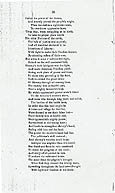
|
|
Defied the power of the throne,
And bravely proved the people's might,
When banded in a righteous cause,
To overthrow oppressive laws.
'Twas then, when struggling at its birth,
To take its proper place beside
The other Nations of the earth,
The rule of justice was applied;
And all mankind declared to be
Inheritors of Liberty;
With right to make their freedom known,
By choosing rulers of their own.
But when it came t' enforce the right,
Gained on the well-contested field,
Slavery's dark intrigues won the fight,
And made victorious Freedom yield;
Giving each place of power and trust,
To those who, groveling in the dust,
Seek to extend the giant crime
Of Slavery through all coming time.
The victory won at fearful cost,
Over a mighty monarch's host,
By which oppression's power seem'd foiled
On the Atlantic's western shore,
And those who through long years had toiled,
The burden of the battle bore,
In order that this land might be
A home and refuge for the free,
Were doomed to see their labor lost ---
Their victory won at fearful cost,
Over oppression's mighty power,
Surrendered in the trying hour;
And made to strengthen slavery's hand,
Ruling with iron rod the land.
The power the warrior's hand had lost,
The politician's skill restored;
And slavery's votaries could boast
Intrigue was mightier than the sword.
But fraud and force in vain combined
To check the progress of the mind;
And every effort proved in vain
T' enslave the cultivated brain.
The same ideas the pilgrim's brought
When first they crossed the wintry wave,
Spreading throughout the land were fraught
With light and freedom to the slave:
|
|
|
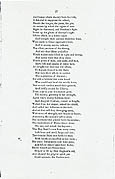
|
|
And hence where slavery bore the rule,
It labored to suppress the school,
Muzzle the tongue, the press, the pen,
As means by which the rights of men
Might be discussed, and Freedom's light
Break up the gloom of slavery's night,
Efforts which, in a better cause
Had brought their authors deathless fame,
Were made to frame oppressive laws,
And to arouse, excite, inflame,
The vilest passions of the throng,
And stir that bitter prejudice
Which makes men blind to right and wrong,
And opens wide that deep abyss
Where pride of rank, and caste, and race,
Have left such marks of bitter hate,
As nought but time can e'er efface,
To foment discord in the State.
But vain their efforts to control
The aspirations of the soul;
For still a faithful few were found
Who would not bend the servile knee,
But in each conflict stood their ground,
And boldly struck for Liberty.
From year to year the contest grew,
Till slavery, glorying in her strength,
Again war's bloody falchion drew,
And sluggish freedom, roused at length,
Waked from her stupor, seized the shield,
And called her followers to the field.
And at that call they thronging came,
With arms of strength, and hearts on flame;
Answering the nation's call to arms,
The northern hive poured forth its swarms;
The lumbermen of Maine threw down
The axe, and seized the bayonet;
The Bay State's sons from every town,
Left loom and anvil, forge and net;
The Granite State sent forth its sons,
With hearts as steadfast as her rocks;
The stern Vermonters took their guns,
And left to others' care their flocks;
Rhode Island and Connecticut
Helped to fill up New England's roll,
And showed the pilgrim spirit yet
Could animate the Yankee soul.
|
|
|
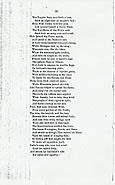
|
|
The Empire State sent forth a host,
Such as might seal an empire's fate;
Even New Jersey held her post,
And proved herself a Union State.
The Key-Stone of the Union arch
Sent forth an army true and tried;
Ohio joined the Union march,
And added to the Nation's side
A force three hundred thousand strong,
While Michigan took up the song;
Wisconsin also, like the lakes,
When the autumnal gale awakes,
And rolls its surges on the shore,
Poured forth its sons to battle's roar.
The gallant State of Illinois
Sent forth in swarms its warlike boys.
On Indiana's teeming plain,
Thick as the sheaves of ripened grain,
Were soldiers hurrying to the wars
To battle for the Stripes and Stars.
From Iowa fresh numbers came,
While Minnesota joined the tide,
And Kansas helped to spread the flame,
And carry o'er the border side
The torch the ruffians once applied
When fiercely, but in vain, they tried
The people of their rights to spoil,
And fasten slavery on her soil.
From East unto remotest West,
From every portion of the North,
The true, the bravest, and the best,
Forsook their homes and sallied forth;
And men from every foreign land
Were also reckoned in that band.
The Scandinavians swelled the train,
The brave Norwegian, Swede, and Dane,
And struck as though Thor rained his blows
Upon the heads of haughty foes;
Or Odin's self had sought the field
To make all opposition yield.
Italia's sons, who once had cried
Loud for united Italy,
And struck by Garibaldi's side
For union and equality---
|
|
|
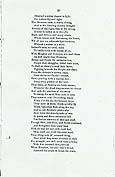
|
|
Obtained another chance to fight
For nationality and right.
The Germans came, a sturdy throng,
And to the bleeding country brought
Friends of the right, foes of the wrong,
Heroes in action as in thought,
Sigel, and Schurz, and many others,
Whose names shall live among the brave,
Till all men are acknowledged brothers,
Without a master or a slave.
Ireland's sons, as usual, came
To battle strike with shouts of joy,
With Meagher and Corcoran won such fame
As well might rival Fontenoy.
Briton and Frank, for centuries foes,
Forgot their struggles, veiled their scars,
To deal on slavery's head their blows,
Fighting beneath the Stripes and Stars.
From the Atlantic's stormy coast,
Unto the broad Pacific's strand,
Came pouring forth a martial host,
From every portion of the land.
They came, as flocking sea birds swarm,
Whene'er the cloud-king mounts his throne
And calls the warriors of the storm
To sweep the earth from zone to zone.
They came as come the rushing waves
When o'er the sea the tempest raves,
They came as storm clouds quickly fly
When lightnings flash along the sky,
And on the Southern plains afar
Soon burst the thunderbolts of war.
In quick and fierce succession fell
The furious showers of shot and shell.
Though East, and West, and North combined,
And foreigners from every land
With all that art and skill could find,
They could not crush the rebel band.
They clung unto th' accursed thing,
That which they knew accursed of God,
Nor strength, nor skill could victory bring
With that accursed thing abroad.
When Abraham, the poor man's friend,
Assumed the power to break the chain.
|
|
|
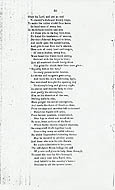
|
|
Obey the Lord, and put an end
To slavery's dark and bloody reign,
To make the nation shield from harm
Its loyal sons of every hue,
In its defence receive and arm
All those who to its flag were true,
He found the touchstone of success,
For then Jehovah deigned to bless,
And smile upon the nation's arms,
And give it rest from war's alarms.
Thus men of every land and tongue,
Of every station, every hue,
Were found the Union hosts among,
Enlisted with the boys in blue;
And all mankind should freely draw
The prize for which their lives were given;
"Equality before the law,"
To every person under heaven.
As storms and tempests pass away,
And leave the sun's enlivening light,
Our war-cloud brought the opening day
To slavery's long and gloomy night.
As storms and thunder help to clear
And purify the atmosphere,
E'en so the thunders of the war,
Driving malaria afar,
Have purged the moral atmosphere,
And made the dawn of freedom clear.
From swamps and marshes left undrained
Malarious vapors will arise,
From human passions, unrestrained,
Rise fogs to cloud our moral skies:
So now, from portions of the land
Where lately slavery reigned supreme,
Its conquered chiefs together band,
Concocting many an artful scheme,
By which Oppression's tottering throne
May be restored to pristine power,
And those who now its rule disown
Be made submissive to its power.
The self-styled Moses brings the aid
Of power and place to help them through,
To crush the race by him betrayed,
And every man who, loyal, true,
And faithful to his country's laws---
Declines to aid the tyrant's cause.
|
|
|
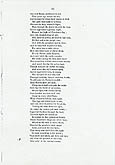
|
|
Our real Moses, stretched his rod
Four years ago across the sea,
And through its blood-dyed waves we trod
The path that leads to Liberty.
His was the fiery column's light,
That through the desert showed the way,
Out of oppression's gloomy night,
Toward the light of Freedom's day;
And, like his prototype of old,
Who used his poser, as Heaven had told,
To God and to the people true,
Died with the promised land in view.
And we may well deplore his loss,
For never was a ruler given,
More free from taint of sinful dross,
To any Nation under Heaven.
And ever while the earth remains,
His name among the first shall stand
Who freed four million slaves from chains,
And saved thereby his native land.
Though Achans rise within the camp,
And covet slavery's cursed spoil,
Invent oppressive laws, to cramp
The energies of men who toil
Through hardship, danger, sickness, health,
To add unto the Nation's wealth ---
Some Joshua shall yet arise,
Whose hand shall extirpate the seeds
Sown by this worst of tyrannies,
Which ripen into bloody deeds
Such fiendish murders as of late
Occur in every rebel State.
While Freedom falters, once again
The fogs and mists begin to rise,
And cast their shadows o'er the plain,
Vailing the issue from our eyes,
On which the nation yet must stand, ---
Impartial freedom through the land.
Yet once again our moral air
Is tainted by that poisonous breath,
Which Freedom's lungs can never bear,
Which surely ends in moral death.
Then let the people in their might
Arise, and send the fiat forth,
That every man shall have the right
To rank according to his worth;
That north and south, and west and east,
All, from the greatest to the least,
Who rally to the nation's cause,
|
|
|
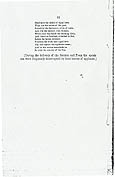
|
|
Shall have the shield of equal laws,
Wipe out the errors of the past,
Nursed by the barbarous pride of caste,
And o'er the nation's wide domain,
Where once was heard the clanking chain,
And timorous bondmen crouched in fear,
Before the brutal overseer,
Proclaim the truth that equal laws
Can best sustain the righteous cause;
And let this nation henceforth be
In truth the country of the free.
[During the delivery of the Oration and Poem the speak-
ers were frequently interrupted by loud bursts of applause.]
 return to Contexts page return to Contexts page
|

